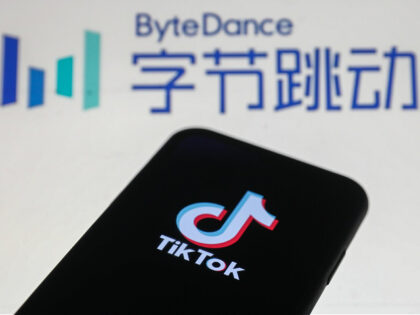Security Breach: Wyze Camera Mishap Allows 13,000 Users to See Strangers’ Property
Wyze, a security camera company boasting 10 million users, is in hot water after a breach allowed 13,000 customers to see into other people’s homes.

Wyze, a security camera company boasting 10 million users, is in hot water after a breach allowed 13,000 customers to see into other people’s homes.

Chinese state media went into overdrive this week to distract from revelations of a massive state-linked Chinese cyberattack on U.S. infrastructure, howling that China is actually the world’s biggest victim of cybercrime, while America is the greatest threat to global information security.

The Chinese Ministry of Science and Technology released “ethical guidelines” for brain-computer interfaces (BCI).

A source in the Japanese government said Chinese hackers leaked classified Japanese diplomatic telegrams in 2020.

The Department of Justice (DOJ) and Federal Bureau of Investigation (FBI) on Wednesday announced they were able to disrupt a massive Chinese cyber-espionage campaign called Volt Typhoon that penetrated critical American infrastructure systems.

Chinese Communist Party-backed hackers are targeting U.S. infrastructure, like water treatment plants and electrical grids, to “wreak havoc.”

The U.S. government is reportedly set to propose new rules requiring hospitals to adhere to basic cybersecurity standards to qualify for federal funding.

The National Security Agency (NSA) released its 2023 cybersecurity report on December 19, looking back over a year in which China and Russia remained massive cyber threats, artificial intelligence (A.I.) displayed growing promise and peril, and cyber threats to critical infrastructure grew more alarming.

2023 was a year filled with cybercrime, especially with the rise of crypto hackers. To celebrate the end of the year, Breitbart Tech has pulled together eight of the most notorious cybercrime incidents of the past 12 months.

Comcast confirmed that a data breach has affected close to 36 million Xfinity customers. Based on the company’s reported number of subscribers, this means practically all Xfinity customers have been placed at risk.

The Washington Post on Monday reported that concerns about China’s growing cyber-warfare assault on U.S. infrastructure systems are justified, as hackers linked to the People’s Liberation Army (PLA) have “burrowed into the computer systems of about two dozen critical entities over the past year.”

A possible cyberattack knocked out phone lines to police and fire departments in Israel for over an hour on Monday night.

The municipal water authority of the Pennsylvania town of Aliquippa announced on Saturday that one of its water stations was hacked by an Iran-backed criminal group called the “Cyber Av3ngers.”

Reuters on Tuesday published a disturbing expose of how thousands of North Koreans have been able to land jobs with foreign tech companies using fake names, phony profiles on services like LinkedIn, and interview scripts tailored to make them sound like they are not the subjects of a psychotic Communist tyranny.

Crooks and scammers are having a field day thanks to the advent of AI technologies used for cloning voices and extracting personal information from social media platforms. Cybercriminals are using AI to create convincing copies of young people’s voices, which are used to power “grandparent scams” targeting elderly relatives.

The Australian government said it was responding to a “significant cyber security incident” affecting several ports that could last a multiple days.

Sheikh Tamim bin Hamad al-Thani, the emir of Qatar, used most of his address to the U.N. General Assembly in New York on Tuesday for boilerplate about sustainable development, rising levels of income inequality, and calls for other nations to resolve their differences through negotiation rather than war.

A cyber security attack on the Clorox Company last month is reportedly causing product availability issues and an impact on its first-quarter earnings.

Microsoft on Thursday said it has detected a Chinese-controlled network of social media accounts that uses A.I. technology to impersonate American voters and spread propaganda to influence U.S. politics.

The FBI on Tuesday announced a successful multinational operation to take down a cybercrime ring known as “Qakbot.” The gang used an enormous botnet to spread ransomware through spam emails, inflicting hundreds of millions of dollars in damage on computer users around the world.

The government of Japan claimed it could not confirm any instance of cyberattacks compromising sensitive intelligence in the hands of the Ministry of Defense on Tuesday, a response to a Washington Post article the day before citing anonymous sources who claimed Japan’s cybersecurity was “shockingly bad.”

India has quietly banned its growing domestic drone industry from using Chinese parts due to fears of security vulnerabilities.

Hackers believed to be linked to China have exploited vulnerabilities in Microsoft software to breach the email systems at over two dozen organizations, including some U.S. government agencies, as part of a suspected cyber-espionage campaign.

Cybersecurity firm Mandiant on Thursday revealed “the broadest cyber-espionage campaign known to be conducted by a China-nexus threat actor since the mass exploitation of Microsoft Exchange in early 2021.”

Reuters reported on Wednesday that a wave of Chinese hackers targeted the Kenyan government in a cyber-espionage campaign that lasted for three years, beginning after Kenya took out gigantic loans from Chinese banks to finance Belt and Road Initiative (BRI) infrastructure projects.

Chinese hackers are targeting “critical communications” infrastructure in stealth-based attacks, Microsoft has warned.

The Cyberspace Administration of China (CAC), the chief regulatory agency for Internet technology in the Communist tyranny, ruled on Sunday that some products from U.S. chipmaker Micron Technology Inc. failed a “security review.”

Former GCHQ chief warns A.I.’s aptitude for producing convincing fakes risks undermining the trust that underpins society.

On Monday’s “Fox News Rundown” podcast, House Oversight Committee Chairman Rep. James Comer (R-KY) stated that the alleged leak of classified documents also highlights the dangers of cyber vulnerabilities because if this amount of damage can be done by one

The Chinese Foreign Ministry on Wednesday claimed the allegedly leaked classified documents from the Pentagon “clearly show that the US has long used its tech edge to conduct indiscriminate secret theft, surveillance and eavesdropping on countries in the world, including its allies.”

Links to shady websites advertising logins for porn platform Onlyfans have reportedly been found by researchers on an EU website.

Italy’s data protection agency announced AI bot ChatGPT will be blocked from the country until it complies with data privacy rules.

The Canadian federal government is still using the Chinese app Tik Tok for advertising despite banning it on all government devices.

China’s annual “Two Sessions” policy jamboree on Tuesday produced a commitment to create a “national data bureau,” which the state-run Global Times hailed as an important step toward establishing the “digital China” of the future.

The Biden administration is endorsing the swift passage of bipartisan legislation that would help “ban or prohibit” foreign technology, including the Chinese social media app TikTok.

Senate Intelligence Committee Chair Mark Warner (D-VA) said he plans to introduce broad bipartisan legislation this coming week that would help “ban or prohibit” foreign technology coming into the United States, including the Chinese social media app TikTok.

China-linked hackers have reportedly been gathering mountains of information from computer networks across the globe — more than the Chinese spy balloon.

The White House issued a directive on Monday that all gave government agencies 30 days to eliminate the Chinese social media app TikTok, which is now banned by law, on any U.S. government devices.

Canada is following the United States in banning the Chinese social media app TikTok from all government-issued devices, which will come into effect on Tuesday, citing an “unacceptable level of risk to privacy and security.”

European Commission staff have been banned from using the Chinese platform TikTok on both government-owned as well as many personal devices over spying concerns.
